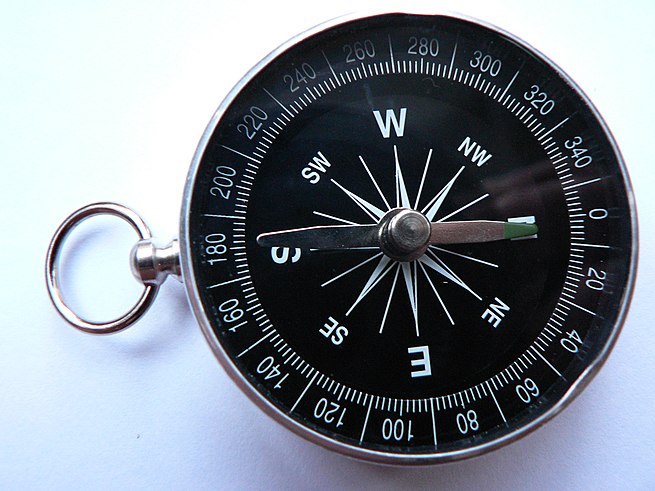
Main Difference
The main difference between Compass and Sextant is that the Compass is a direction finding and navigation instrument and Sextant is a angle measurement instrument.
-
Compass
A compass is an instrument used for navigation and orientation that shows direction relative to the geographic cardinal directions (or points). Usually, a diagram called a compass rose shows the directions north, south, east, and west on the compass face as abbreviated initials. When the compass is used, the rose can be aligned with the corresponding geographic directions; for example, the “N” mark on the rose points northward. Compasses often display markings for angles in degrees in addition to (or sometimes instead of) the rose. North corresponds to 0°, and the angles increase clockwise, so east is 90° degrees, south is 180°, and west is 270°. These numbers allow the compass to show magnetic North azimuths or true North azimuths or bearings, which are commonly stated in this notation. If magnetic declination between the magnetic North and true North at latitude angle and longitude angle is known, then direction of magnetic North also gives direction of true North.
Among the Four Great Inventions, the magnetic compass was first invented as a device for divination as early as the Chinese Han Dynasty (since c. 206 BC), and later adopted for navigation by the Song Dynasty Chinese during the 11th century. The first usage of a compass recorded in Western Europe and the Islamic world occurred around 1190.
-
Sextant
A sextant is a doubly reflecting navigation instrument that measures the angular distance between two visible objects. The primary use of a sextant is to measure the angle between an astronomical object and the horizon for the purposes of celestial navigation. The estimation of this angle, the altitude, is known as sighting or shooting the object, or taking a sight. The angle, and the time when it was measured, can be used to calculate a position line on a nautical or aeronautical chart—for example, sighting the Sun at noon or Polaris at night (in the Northern Hemisphere) to estimate latitude. Sighting the height of a landmark can give a measure of distance off and, held horizontally, a sextant can measure angles between objects for a position on a chart. A sextant can also be used to measure the lunar distance between the moon and another celestial object (such as a star or planet) in order to determine Greenwich Mean Time and hence longitude. The principle of the instrument was first implemented around 1731 by John Hadley (1682–1744) and Thomas Godfrey (1704–1749), but it was also found later in the unpublished writings of Isaac Newton (1643–1727). Additional links can be found to Bartholomew Gosnold (1571–1607) indicating that the use of a sextant for nautical navigation predates Hadley’s implementation. In 1922, it was modified for aeronautical navigation by Portuguese navigator and naval officer Gago Coutinho.
-
Compass (noun)
A magnetic or electronic device used to determine the cardinal directions (usually magnetic or true north).
-
Compass (noun)
A pair of compasses (a device used to draw an arc or circle).
-
Compass (noun)
The range of notes of a musical instrument or voice.
-
Compass (noun)
A space within limits; an area.
-
Compass (noun)
An enclosing limit; a boundary, a circumference.
“within the compass of an encircling wall”
-
Compass (noun)
Moderate bounds, limits of truth; moderation; due limits; used with within.
-
Compass (noun)
scope.
-
Compass (noun)
A passing round; circuit; circuitous course.
-
Compass (verb)
To surround; to encircle; to environ; to stretch round.
-
Compass (verb)
To go about or round entirely; to traverse.
-
Compass (verb)
To accomplish; to reach; to achieve; to obtain.
-
Compass (verb)
To plot; to scheme (against someone).
-
Compass (adverb)
In a circuit; round about.
-
Sextant (noun)
A navigational device for deriving angular distances between objects so as to determine latitude and longitude.
-
Sextant (noun)
One sixth of a circle or disc; a sector with an angle of 60°.
-
Sextant (noun)
One of six groups of adjacent teeth, excluding the wisdom teeth. The front sextants go from canine to canine, and there are sextants on the right and left of these. See w:Periodontal examination.
-
Compass (noun)
an instrument containing a magnetized pointer which shows the direction of magnetic north and bearings from it
“walkers should be equipped with a map and compass”
“a magnetic compass”
“Crewe was ideally placed on the rail network, with connections running to all points of the compass”
-
Compass (noun)
an instrument for drawing circles and arcs and measuring distances between points, consisting of two arms linked by a movable joint, one arm ending in a point and the other usually carrying a pencil or pen
“a regular heptagon cannot be constructed accurately with only ruler and compass”
-
Compass (noun)
the range or scope of something
“the event had political repercussions which are beyond the compass of this book”
“goods and services which fall within the compass of the free market”
-
Compass (noun)
the enclosing limits of an area
“this region had within its compass many types of agriculture”
-
Compass (noun)
the range of notes that can be produced by a voice or a musical instrument
“the cellos were playing in a rather sombre part of their compass”
-
Compass (verb)
go round (something) in a circular course
“the ship wherein Magellan compassed the world”
-
Compass (verb)
surround or hem in on all sides
“we were compassed round by a thick fog”
-
Compass (verb)
contrive to accomplish (something)
“he compassed his end only by the exercise of violence”
-
Sextant (noun)
an instrument with a graduated arc of 60° and a sighting mechanism, used for measuring the angular distances between objects and especially for taking altitudes in navigation and surveying.
